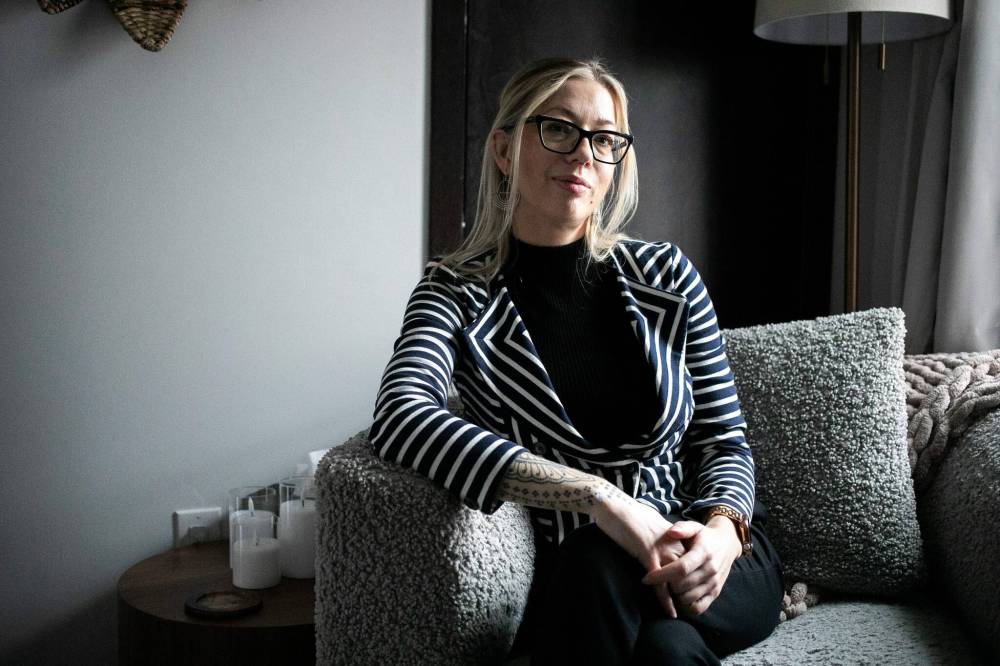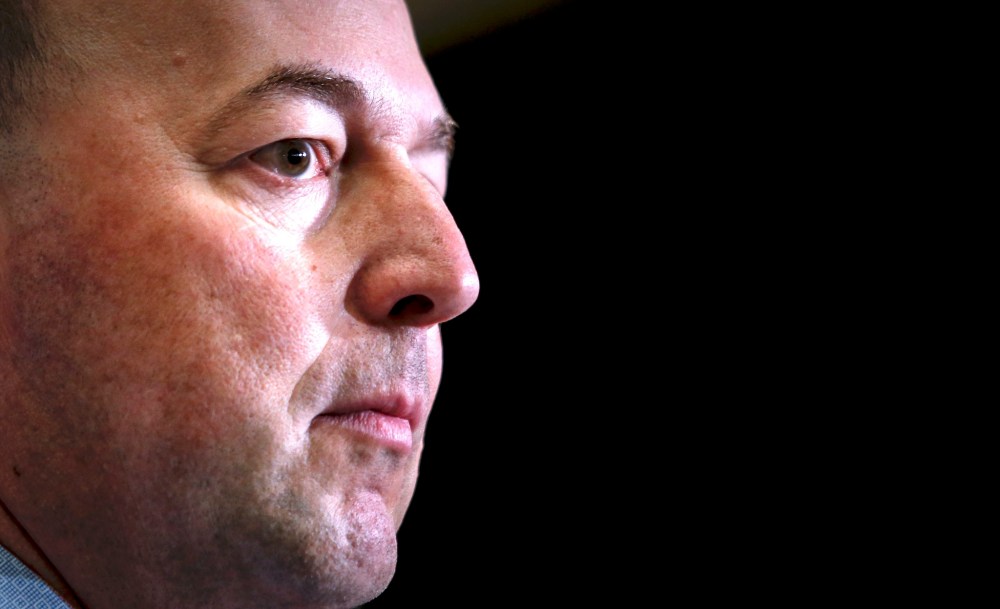Gambling their lives away To address gambling-related suicide in Manitoba, addiction professionals say medical officials first need to get in the game when it comes to identifying and collecting data on such deaths
Read this article for free:
or
Already have an account? Log in here »
To continue reading, please subscribe:
Monthly Digital Subscription
$0 for the first 4 weeks*
- Enjoy unlimited reading on winnipegfreepress.com
- Read the E-Edition, our digital replica newspaper
- Access News Break, our award-winning app
- Play interactive puzzles
*No charge for 4 weeks then price increases to the regular rate of $19.95 plus GST every four weeks. Offer available to new and qualified returning subscribers only. Cancel any time.
Monthly Digital Subscription
$4.99/week*
- Enjoy unlimited reading on winnipegfreepress.com
- Read the E-Edition, our digital replica newspaper
- Access News Break, our award-winning app
- Play interactive puzzles
*Billed as $19.95 plus GST every four weeks. Cancel any time.
To continue reading, please subscribe:
Add Free Press access to your Brandon Sun subscription for only an additional
$1 for the first 4 weeks*
*Your next subscription payment will increase by $1.00 and you will be charged $16.99 plus GST for four weeks. After four weeks, your payment will increase to $23.99 plus GST every four weeks.
Read unlimited articles for free today:
or
Already have an account? Log in here »
Hey there, time traveller!
This article was published 07/03/2025 (299 days ago), so information in it may no longer be current.
On Sept. 18, 2009, Chris Parlow bet his last $18 on the New York Yankees beating the Seattle Mariners. He tuned into the Major League Baseball game on his car radio in a remote wooded area in northern Ontario, nearly a day’s drive from Winnipeg. He was out of gas and alone.
Parlow told loved ones he was going on a fishing trip, but left the province with intentions of visiting his birthplace in New Brunswick. There he planned to die by suicide.
For two decades, Parlow had kept his gambling addiction secret. He wasn’t confiding in medical professionals or his loved ones and didn’t see any other options in front of him.
Parlow loved sports and was always competitive. He played a laundry list of them growing up, including hockey and football, cycled from Vancouver to Halifax in 1980 when he was 20, and later in that decade ran several full Manitoba Marathons.
But these pursuits fell by the wayside when he was 29 years old.
TREVOR HAGAN / FREE PRESS Chris Parlow is a recovering gambler whose addiction nearly led him to take his own life.
He recalls getting hooked on gambling shortly after visiting the Crystal Casino at the Fort Garry Hotel for the first time.
“Within a week my life was completely different than it had ever been,” he recalls. “I never had any need for drugs. But when I started gambling, that was it. That was my drug of choice.”
His life turned inward, his finances downward, as Proline and VLTs took the place of athletic triumphs. Parlow didn’t invite friends to his apartment because he didn’t want them to see his spartan living conditions. Every dollar he could muster fuelled his addiction.
Over two decades, he lost his house and cars and filed for bankruptcy, compounding tragedies for which he would always make an excuse.
“Nobody had any idea that I was who I was — a gambling addict who was out of control.”
Isolated in the woods, Parlow was unaware his loved ones had sensed something was wrong. As he listened to the Mariners take the lead over the Yanks, he didn’t know a manhunt was underway to find him, with his name and description shared in a missing person report.
A police officer, tipped off by hunters to a strange car parked in the woods, found him that night.
“For the first time in my life, I told somebody the truth,” he says.
The officer took Parlow to a hospital, and upon returning to Manitoba he entered a treatment facility. Tragedy was averted.
“I never had any need for drugs. But when I started gambling, that was it. That was my drug of choice.”–Chris Parlow
Today, Parlow is 64, married and a doting owner to a dog named Delta. He lives a comfortable life in recovery in British Columbia and shares his story of coming back from the brink whenever he can.
But not everyone who feels suicidal because of their gambling gets another chance like Parlow has.
Provincial coroners’ and medical examiners’ offices have recorded at least 965 gambling-related suicides in Canada between 2000 and 2023. This means one Canadian dies from gambling-related suicide about every nine days.
Gambling was already a part of mainstream life in Canada, marketed by governments as a win-win proposition, with prizes for players and revenues for provinces to increase spending without raising taxes. But it has come with costs.
Yet opportunities to gamble keep proliferating, with Premier Wab Kinew even expressing an openness for another casino in Winnipeg.
It’s virtually impossible to get through a day without being exposed to gambling ads, whether it’s browsing social media, on the boards of a hockey arena or hearing odds discussed on sports radio or podcasts.
In this new world of government-sanctioned gambling, effective tracking of harms like betting-related suicide is more critical than ever.
Gambling addiction can be hard to spot, making it challenging to identify who is afflicted, unless they choose to share this information with doctors, mental-health professionals or loved ones.
Sometimes the addiction even remains hidden following a person’s death.
This is why it’s important we understand the consequences of gambling addiction, particularly in Manitoba. Since 2000, the province has had some of Canada’s highest rates of gambling addiction.
Suicide is a well-known consequence. Between 1996 and 2004, stories on gambling-related suicides appeared in the Free Press nearly every year.
Concerns ran so high after two Manitobans addicted to gambling committed suicide within a two-month span that the RCMP took the “unprecedented step” of issuing a missing-person report when a known gambler went missing in January 1998.
Manitoba data
The Office of the Chief Medical Examiner shared data with the Free Press. In early December 2024, the OCME reported it had recorded 35 gambling-related suicides since 1999. At the time, the office broke them down as follows:
- 1999-2003: 13
- 2004-2008: 10
- 2009-2013: 8
- 2014-2018: 2
- 2019-Present: 2
To align with the other national data used in this investigation, the office later confirmed that 32 of these suicides took place between 2000 and 2023.
In 2003, a tracking plan was introduced after a Canadian Press investigation uncovered elevated rates of gambling-related suicides in Alberta and Nova Scotia. It led to discussion at a national meeting of coroners and medical examiners about the importance of accurate identification and recording of gambling addiction-related deaths and working on a plan to prevent them.
They decided to note gambling as a risk factor when mentioned in a suicide note or in interviews with the deceased’s loved ones.
According to the Office of the Chief Medical Examiner (OCME) of Manitoba, it still follows this method of recording gambling-related suicides, yet records since 2000 show it’s been ineffective in helping Manitobans avoid such an end.
In a review of Canadian gambling-related suicide data provided by coroners and medical examiners, the Free Press found that of 965 deaths between 2000 and 2023 in all provinces, only 32 were identified in Manitoba.
Furthermore, in 13 individual years since 2000, the OCME did not record a single gambling-related suicide. No province that provided data had more gaps.
The years with zero reported relevant deaths differ from prior OCME reporting. In January 1998, the province reported six gambling-related suicides in the previous two years. Today the OCME reports only five since 2010.
Melissa Potter, a psychiatric nurse and therapist in Winnipeg, says about one in 10 of her addiction clients cites gambling as their primary concern. A small number of them — Potter estimates about three to five per cent — display suicidal ideation because of their gambling.
“As a province, we need to start collecting better data,” she says when told how few gambling-related suicides the province has recorded in the last decade-and-a-half. It’s data that could help her and her peers identify clients who might be suicidal and help direct them toward life-saving resources.
“I think having absolutely no suicide deaths (linked) to gambling (in that period) is concerning. I don’t think that’s accurate.”
And it isn’t, according to an expert who studies gambling-related suicides.
MIKAELA MACKENZIE / FREE PRESS Melissa Potter, a psychiatric nurse and therapist who specializes in addictions, says one in 10 of her clients cites gambling as a primary concern. 
Angela Rintoul of Australia’s Melbourne School of Population and Global Health has used data from coroners to track the prevalence of gambling-related suicides in that country’s state of Victoria. A scholarly review of multi-year data she published found gambling-related suicides were undercounted at four per cent of overall suicides.
Experts including Rintoul suggest gambling-related suicides may represent up to 20 per cent of suicides if deeper investigation techniques, such as using financial records, are used.
Meanwhile, in Manitoba, gambling-related suicides topped out at nearly 3.9 per cent in 2001. Besides the years with zero recorded, the prevalence rate is less than one per cent of all suicides in five other years.
Rintoul doubts the probability of so many years with no actual gambling-related suicides, as both Manitoba and Victoria have high numbers of electronic gambling machines.
Unlike most other Canadian provinces, the number of VLTs installed in Manitoba has been on the rise.
According to a freedom of information request filed by the Free Press, there were 5,012 VLTs in operation in 2000 and 6,663 in 2023, an increase of nearly 33 per cent.
Manitoba also has a higher general rate of suicide than Victoria — 13.5 per 100,000 here compared to 9.4 in the Australian state.
Even with Manitoba having about 4.5 times fewer residents, the difference in gambling-related suicides in the 2009-16 period is striking: Victoria counts 184 and Manitoba seven.
“I can’t think of what would suddenly stop during that time (to result in such a decrease); that just seems very unusual,” Rintoul says of the years with zero reported gambling-related suicides in Manitoba.
“We appreciate there’s probably many, many cases we’ve probably missed.”–Gordon Holens
Gordon Holens, an OCME statistician since 1999, suggests the distinction simply got lost in the shuffle. Neither the Manitoba office nor its counterparts elsewhere in Canada is mandated to track suicide risk factors, only to determine more basic death-related factors, such as who, where, when and how, rather than why.
Holens says it’s not feasible to conduct psychological autopsies, which identify risk factors by investigating events potentially relevant to a death as well as the deceased’s psychological state, when as many as 200 Manitobans die annually by suicide.
“We appreciate there’s probably many, many cases we’ve probably missed because these questions aren’t routinely asked,” Holens says.
But former OCME practices to track gambling-related suicides could have prevented more than a decade of information gaps.
Holens says the OCME database has had a “death was gambling-related” checkbox since 1999 or shortly after. But the office never had a “formal definition” on when to use it, and the tracking tool “has not been used with any regularity for some time,” he adds.
There had also been a change of practice to proactively ask about gambling’s role in suicides.
“As in Ontario, investigators with Manitoba’s medical examiner’s office ask relatives in every suicide whether gambling played a role in the death,” the Free Press reported in 2004. Today neither province does.
Former Manitoba chief medical examiner Dr. Thambirajah Balachandra commented at the time that the office was limited by the responses it received.
“Many gamblers are also alcoholics with major marital problems,” he told the Free Press in 2004. This created challenges for medical examiners in determining how prominent gambling was as a suicide risk factor.
JOHN WOODS / THE CANDIAN PRESS FILES Dr. John Younes, Chief Medical Examiner of Manitoba.
The OCME did not make Chief Medical Examiner Dr. John Younes available for an interview, but forwarded to him prepared questions from the Free Press. Younes responded with a six-paragraph statement that did not specifically address all questions posed, including why the OCME no longer asks relatives about gambling’s role in family members’ suicides and if it would be open to changing its approach.
In his statement, Younes says “with confidence that suicides due to problem gambling are few and far between in this province,” citing the lack of suicide notes or interviews with loved ones that mention it as a precipitating factor.
He estimates gambling-related suicides “likely account for one per cent or fewer of the total suicides in the province each year.”
Of the figures provided to the Free Press by the OCME, there are three years between 2000 and 2023 where the reported rate of gambling-related suicides was between one and 1.9 per cent of total suicide deaths, one year between two and 2.9 per cent and two years between three and 3.9 per cent.
When asked for comment on these statistics and for other clarifications, Younes did not respond before publication.
The motivating factors Younes cites as common for suicides in the province include “longstanding mental health problems,” “substance use disorders,” “recent breakup of a relationship” and non-gambling-related “financial difficulties.”
Notably, gambling can intersect with all of these causes as a potential secondary factor. For example, debts accrued through betting could be the cause behind the breakdown of a marriage or relationship or mounting financial difficulties.
Though no province can perfectly track the prevalence of gambling-related suicides, two are making efforts to address the issue as legalized gambling continues to expand.
New Brunswick’s coroner system launched a new tracking method for gambling-related suicides in 2024 and Newfoundland and Labrador is exploring how to track problem gambling and other risk factors for suicide.
Younes says in his response that “Manitoba will absolutely make any changes necessary” to respond to potential updates of national guidelines. He did not indicate whether the province would be willing to commit to such change of its own volition.
Marion Cooper, CEO of the Canadian Mental Health Association’s Manitoba chapter, questions the failure to gather relevant information on gambling-related suicides in the province.
“As we’ve seen access to gaming opportunities increasing, we’re not seeing gambling-related harms being accurately reported,” she said.
Multiple casinos have opened in the province since 2000, including the Shark Club gaming centre in downtown Winnipeg, and several others on First Nations.
The launch of the Manitoba Liquor and Lotteries Corporation playnow.com website and the explosion in legalized single-sport betting have also provided Manitobans with a wide range of opportunities to gamble.
Gambling revenues for Manitoba Liquor and Lotteries, counting casinos, lottery, online gambling and VLTs, reached nearly $665 million in the 2023-24 fiscal year.
MIKE DEAL / FREE PRESS Gambling revenues for Manitoba Liquor and Lotteries reached nearly $665 million in the 2023-24 fiscal year.
Cooper, who has worked in the social work and mental-health fields since 1992, recalls times during her career when Manitoba’s compilation of health-related data was incredibly effective.
In a previous role with the Winnipeg Regional Health Authority, she remembers the OCME frequently sharing data that was helpful in suicide-prevention work. One year, she recalls being involved in a project where a psychological autopsy was completed on every suicide death in order to better understand root causes and “how people fell through the cracks.”
“I suspect there are gaps, and our systems have eroded because we haven’t invested in these kinds of data systems to inform decision making and policy work,” Cooper says.
One data source that offers context is Manitoba’s helplines, which hear about gambling concerns with surprising frequency.
In November 2024, a Shared Health spokesperson said in a written statement that over the past 10 years Manitoba’s Problem Gambling Helpline received 3,904 calls “from people with gambling challenges” and another 475 from those affected by someone else’s gambling.
“Of those calls, 203 are listed as having suicide content, which often includes expressing the idea of ‘hitting bottom’ or feelings of deep hopelessness,” the Shared Health spokesperson added. This represents 4.64 per cent of the calls over that decade.
When asked what would be a significant percentage of calls on a particular issue, Richelle Ready, manager of crisis support services at Klinic Community Health, said: “I think one per cent is a significant number. If we’re having conversations with folks that are having thoughts of suicide, we always need to be taking that seriously.”
Ready says having statistics about gambling-related suicides could help organizations like Klinic, which work with people facing a range of addictions.
“The more information we have about how behaviours increase risk, the more successful we are in providing support, intervention and a risk assessment,” she said.
She adds that because Klinic’s crisis services are confidential and anonymous, it doesn’t always know the age, gender or other demographics of who it serves. This makes it hard to know who is being left out when promoting crisis services in Manitoba.
JOHN WOODS / FREE PRESS One Canadian dies from gambling-related suicide about every nine days.
“If we have an understanding on a provincial level about the populations that are more at risk of death by suicide in gambling-related situations, then we can share information in those spaces,” Ready said.
That way, she said, people who may not otherwise be aware of services that could help them can “hopefully reach out for support prior to making a decision to die.”
Younes was asked about sharing risk-factor data with addiction-intervention professionals like Potter and Ready.
“I am fully on board with gathering all relevant information during our investigations of suicides and disseminating data to government and other stakeholders,” he says.
In addition to potential reform of best practices for investigating and reporting such deaths, which Younes says chief coroners and medical examiners have been working toward with the Public Health Agency of Canada, he says the OCME’s electronic database is being expanded and enhanced.
“When complete, this will allow for quick and easy analyses of case data for any cause or manner of death including gambling related suicides.”
No timeline was offered for either project.
Chris Parlow, now gambling-free for more than 15 years, pursues passions like photographing wildlife or enjoying his season tickets for the CFL’s B.C. Lions, where he once would have spent his time and money chasing bets.
TREVOR HAGAN / FREE PRESS Today, Chris Parlow is 64, married and a doting owner to a dog named Delta. He lives a comfortable life in recovery in British Columbia.
He frequently takes his camera to BC Place, not just to capture images of the game, but as a shield against the encroachment of gambling into spectators’ gameday experience.
“My camera is kind of like a buffer between me and all the ads,” he says.
Parlow believes there’s a deeper reason the OCME should be watching for gambling-related suicides beyond their capacity to help.
“Covering up or not acknowledging the suicides is perpetuating secrets and perpetuating an illness that avoids detection at all costs,” he says. It reminds him of all the years he kept his own gambling addiction secret.
“We don’t need people like medical examiners to be complicit with us.”
This project was supported by the Michener-Deacon Fellowship for Investigative Reporting. Freelance journalist Rob Csernyik was the 2022 recipient. His work examines the relationship between gambling and suicides in Canada and what governments and public-health authorities are doing to address the problem.
If you or someone you care about needs help with gambling or addiction, reach out to one of the resources listed on the Manitoba Liquor and Lotteries website.
A gambling helpline offers help 24 hours a day, seven days a week: 1-800-463-1554
If you are dealing with thoughts of suicide or are worried about someone else, call or text 988 or visit the 988 Lifeline website (988.ca) to speak with a trained responder at Canada’s Suicide Crisis Helpline.




